许国璋英语第二册
许国璋英语第二册第二课课文、对话、练习,前微软中国区总经理吴士宏学习英文的教 材
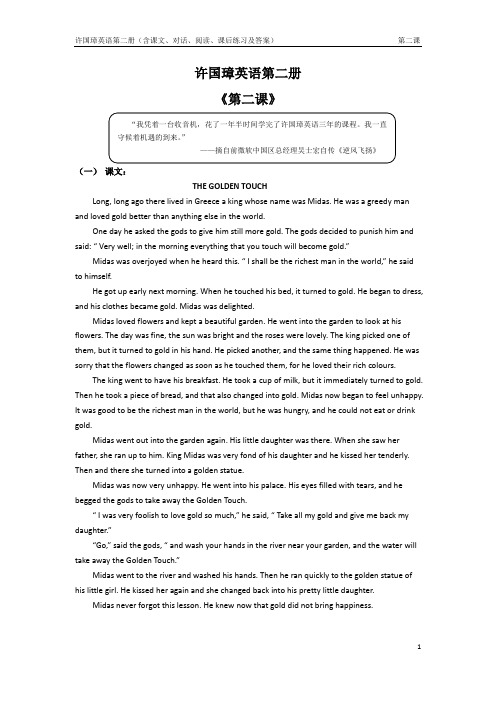
许国璋英语第二册《第二课》(一)课文:THE GOLDEN TOUCHLong, long ago there lived in Greece a king whose name was Midas. He was a greedy man and loved gold better than anything else in the world.One day he asked the gods to give him still more gold. The gods decided to punish him and said: “ Very well; in the morning everything that you touch will become gold.”Midas was overjoyed when he heard this. “ I shall be the richest man in the world,” he said to himself.He got up early next morning. When he touched his bed, it turned to gold. He began to dress, and his clothes became gold. Midas was delighted.Midas loved flowers and kept a beautiful garden. He went into the garden to look at his flowers. The day was fine, the sun was bright and the roses were lovely. The king picked one of them, but it turned to gold in his hand. He picked another, and the same thing happened. He was sorry that the flowers changed as soon as he touched them, for he loved their rich colours.The king went to have his breakfast. He took a cup of milk, but it immediately turned to gold. Then he took a piece of bread, and that also changed into gold. Midas now began to feel unhappy. It was good to be the richest man in the world, but he was hungry, and he could not eat or drink gold.Midas went out into the garden again. His little daughter was there. When she saw her father, she ran up to him. King Midas was very fond of his daughter and he kissed her tenderly. Then and there she turned into a golden statue.Midas was now very unhappy. He went into his palace. His eyes filled with tears, and he begged the gods to take away the Golden Touch.“ I was very foolish to love gold so much,” he said, “ Take all my gold and give me back my daughter.”“Go,” said the gods, “ and wash your hands in the river near your garden, and the water will take away the Golden Touch.”Midas went to the river and washed his hands. Then he ran quickly to the golden statue of his little girl. He kissed her again and she changed back into his pretty little daughter.Midas never forgot this lesson. He knew now that gold did not bring happiness.(二)课文译文点金术很久很久以前,在希腊居住着一位名叫迈达斯的国王。
许国璋英语第二册

continent n. 洲;大陆asia n. 亚洲asian n. & adj. 亚洲人,亚洲的america n. 美洲north america 北美洲south america 南美洲american adj. 美洲的europe n. 欧洲mass n. (聚成一体的)团、块land mass 地块geographer n. 地理学家regard vt. 认为peninsula n. 半岛the ural mountains 乌拉尔山脉form vt. 组成;构成divide vt. 划分;隔(分)开dividing line 分界线link vt. 连结;连接exact adj. 确切的;准确的alaska n. 阿拉斯加(美国一州) connect vt. 连结;连接tip n. 尖端;顶端siberia n. 西伯利亚american indian 美洲印第安人bridge n. 桥梁land bridge 地峡settle vi. 定居;安家canal n. 运河the suez canal 苏伊士运河separate vt. 使分开(离)peak n. 山峰;最高点foot n. 英尺altitude n. 高度(尤指海拔) uncertain adj. 变化无常的pride n. 骄傲religion n. 宗教originate vi. 起源于;发源于buddhism n. 佛教christianity n. 基督教palestine n. 巴勒斯坦palestinian n. 巴勒斯坦人islam n. 伊斯兰教arabia n. 阿拉伯半岛principal adj. 重要的;主要的quarter n. 四分之一japanese n. 日本人iranian n. 伊朗人iraqi n. 伊拉克人filipino n. 菲律宾人singapore n. 新加坡人the asian games 亚运会civilization n. 文明science n. 科学technology n. (工业)技术miss vt. 惦记,想念;错过wonderful adj. 奇妙的;极好的bit n. 小片a bit of 一点quite a bit of 相当多(不可数) quite a few 相当多(可数) excellent adj. 优秀的;极好的festival n. 节日the spring festival 春节evergreen adj. 常绿的get-together n. 聚会,“联欢会”get down to 开始做solid adj. 坚实;踏实touch n. 接触;v. 触,碰greece n. 希腊king n. 国王gold n. 金子world n. 世界punish vt. 惩罚overjoyed adj. 非常高兴turn to 变成delighted adj. 大喜rose n. 玫瑰pick vt. 采摘;拾起happen vi. 发生milk n. 牛奶immediately adv. 立刻piece n. 块,片a piece of 一块,一片unhappy adj. 不快,苦恼hungry adj. 饥饿drink vt. 饮fond adj. 喜欢be fond of 喜欢kiss vt. 吻tenderly adv. 深情地,温存地then and there 当时当地;立刻statue n. (全身)塑像fill vt. 充满tear n. 眼泪beg vt. 乞求pretty adj. 漂亮happiness n. 快乐,幸福bedtime n. 就寝的时刻fetch vt. 去拿(取)boil vt. 煮沸boiled 煮开的plenty n. 好些,很多thermos bottle n. 热水瓶thanks n. 谢谢thirsty adj. 渴just now 刚才steam n. 蒸气;暖气设备fault n. 错处wonder n. 奇事,奇迹no wonder 怪不得ice-box n. 冰箱box n. 盒子scotland n. 苏格兰century n. 世纪rule vt. 统治named vt. 名叫wise adj. 聪明brave adj. 勇敢的soldier n. 军人,兵士,战士invade vt. 入侵arms n. 武器defence n. 保卫in defence of 保卫against prep. 反对enemy n. 敌人scatter vt. 使散开;击溃force vt. 强迫wood n. 树林lonely adj. 偏僻的;寂寞的rainy adj. 有雨的lie vi. 躺着sound n. 声音roof n. 屋顶give up 放弃seem 看起来,象是use n. 用处spider n. 蜘蛛spin vt. 纺;(吐丝)织(网) web n. 网reach vt. 到达toil vi. 艰苦地劳动care n. 关心;注意with care 小心地opposite adj. 相反的,对面的fix vt. 系牢thread n. 丝,线fail vi. 失败poor adj. 可怜的;穷的lose vt…失掉hope n. & vi. 希望almost adv. 几乎own adj. 自己的trouble n. 烦恼;麻烦swing vt. 摆动;荡slender adj. 纤细的line n. 线safely adv. 安全地call vt. 叫;召集send vt. 送,派message n. 信息;口信cheer n. 鼓舞;欢呼disheartened adj. 灰心;失望的scotsman n. 苏格兰人gather vi. & vt. 聚集,集合win vi. & vt. 战胜invader n. 侵略者drive vt. 驱逐;开(车) training n. 训练physical training 体育sports ground n. 操场high adj. 高的jump n. 跳跃either...or conj. 或…或…break vi. & vt. 打破,破碎break into groups 分为小组volley-ball n. 排球to play class three 与第三班比赛holiday n. 假日suggest vt. 提议reservoir vt. 水库the great wall 长城revisit vt. 再次访问,重游bank n. 河岸the yungting river 永定河the year before 一年前,前一年surrounding adj. 周围的close adj. 近的;紧密的tie n. 系带;(引抻为)联系villager n. 村子里的人spirit n. 精神be in high spirits 情绪很高,兴高采烈still adj. 安静,不动outside prep. 在外面well-cultivated adj. 精细耕种的pass vt. 经过power n. 威力;电力plant n. 工厂valley n. 山谷below adv. & prep. 在下面leap n. 跳跃keep doing something 不断地做某事pleased adj. 高兴strong adj. 强健;强大achieve vt. 取得(成就)sheep n. 绵羊pig n. 猪horse n. 马sign n. 象征,迹象prosperity n. 繁荣grow vi. 成长dig vt. 挖,掘pit n. 坑join vt. 加入,参加exciting adj. 令人兴奋的picnic vi. & n. 野餐add vt. 加上the rest n. 其余的人(东西)entrance n. 入口处suppose vt. 猜想camera n. 照相机bloom n. 开花be in bloom (花)正开着none pron. 没有人san francisco 圣弗兰西斯科(旧金山) city n. 市;城市coast n. 海岸enjoy vt. 喜爱period n. 课时each adv. 各;每个meet 会见supply n. (pl.)供应品check v. 检查assignment n. 指定的(课外)作业assign vt. 指定(课外作业)steadily adv. 持续地punctuation n. 标点符号composition n. 作文literature n. 文学;文学作品favourite adj. 特别喜爱的subject n. 学科;课目poem n. (一首)诗pour vi. 涌来;源源而来heartbreaking adj. 令人心碎的keen adj. 热心的(观众等)viewer n. 观众view vt. 看television 电视theatre n. 戏剧tv theatre 电视剧recognize vt. 认出;认识到title n. 标题recent adj. 最近的;新近的contain vt. 包含;有lively adj. 生动活泼的accomplish vt. 完成(任务等)bore vt. 使…感到腻味once conj. 一旦…(就)guide vt. 引导general adj. 总的,一般的general cleaning 大扫除,260broom n. 扫帚dustpan n. 盛尘土的簸箕mop n. 拖把as well 也downstairs adv. 在楼下,往楼下furniture n. 家具(统称)tidy up vt. 整理,使整齐cloud n. 云impossible adj. 不可能sitting-room n. 客厅,起居室sofa n. 长沙发by prep. 在旁边fireside n. 炉边(炉火附近) perfectly adv. 十分地darling n. 亲爱的人about prep. 在周围,在附近next to 在…隔壁bookcase n. 书架,书橱seat n. 座位window-seat n. 窗座draw vt. 拉(上)pray vt. 祷告discover vt. 发现master n. 主人armchair n. 扶手椅stout adj. (身体)肥壮的business n. 事have no business to 无权(做某事) continue vt. & vi. 继续dependent n. 靠人生活的人mama n. 妈妈ought mod. & v. 应当,应该strike vi. 打击;碰击pain n. 疼痛sharp adj. 厉害,剧烈wicked adj. 坏,恶劣的cruel adj. 残酷的slave-driver n. 驱使奴隶作工的人grasp vt. 抓住shoulder n. 肩desperate adj. 什么也不顾的loud adv. 大声地mrs. n. …夫人lock vt. 锁upstairs adv. 往楼上shame n. 羞耻,可耻的事for shame 真不象话!servant n. 佣人turn away 赶走poor-house n. 贫民收容所what's on tonight? 今晚有什么活动?picture n. 电影i have no idea 我不知道march n. & vi. 行进,行军the long march 长征save vt. 保留,省下possible adj. 可能的minister n. 部长shovel n. 锹,铲子volunteer n. 义务(志愿)工作者tomb n. 陵墓elderly adj. 上了年纪的person n. 人site n. 场地construction site 工地government n. 政府vice-minister n. 副部长department n. 部门charge n. 管理in charge of 负责(某事)ordinary adj. 普通的,平常的kilometre n. 公里greeting n. 招呼,问候fellow n. 人blazing hot 炎热rock n. 岩石;石块joke vi. 说笑话melon n. 瓜handcart n. 手推车drip vi. 滴;淌soak vt. 浸透,泡(水)all the while 一直地enthusiastically adv. 热情地complete vt. 完成,344schedule n. 完成工作的时间表ahead of schedule 提前be used to 习惯于express vt. 表达feeling n. 感觉,感情furnace n. 炉,熔炉temper vt. 锻炼once in a while 每隔一段时间whole adj. 整个的sweat vi. 流汗;n. 汗water vt. 浇水eggplant n. 茄子manure n. 肥料carrying-pole n. 扁担bucket n. 水桶the great pyramid 大金字塔pyramid n. (埃及的)金字塔ancient adj. 古代的;古老的egypt n. 埃及(非洲)body n. 身体;尸体safe adj. 安全的treasure n. (复数)金银珍宝be located 坐落于the nile river nail 尼罗河(非洲) cairo n. 开罗(埃及首都)egyptian adj. & n. 埃及的,埃及人compare vt. 比较;对照compare...to 比作…;比喻为…set vi. (日,月等)落bury vt. 埋葬;葬block n. 街区;大块average n. 平均;平均数ton n. 吨machinery n. (总称)机器;机械flood n. 涨水;洪水cover vt. (占地)面积为acre n. 英亩(合6. 07亩)outdo vt. 超过;胜过limestone n. 石灰石coffin n. 棺材;柩preserve vt. 防腐(以长久保存) wear away 磨损exposed adj. 暴露在外的the sphinx 巨大的狮身人面石像lion n. 狮子the libyan desert 利比亚沙漠(非洲) libya 利比亚the nile valley 尼罗河流域modern adj. 现代的devoted adj. 忠实的honest adj. 诚实的cottage n. 农舍alone adv. 独自地miller n. 磨坊老板bouquet n. 一束(花)plum n. 李子cherry n. 樱桃real adj. 真正的,真实的share vt. 分享;分担noble adj. 高尚的;高贵的in return 作为报答suffer vi. 受…之苦besides adv. 而且,此外bother vt. 打搅friendship n. 友谊primrose n. 樱草pleasure n. 乐趣,愉快priest n. 牧师three-storeyed adj. 三层楼的ring n. 戒指finger n. 手指porridge n. 粥rabbit n. 兔子silly adj. 傻,愚蠢fire n. 火;炉火wine n. 酒envy vt. 嫉妒;羡慕flour n. 面粉on credit 赊给spell vt. 拼写sleepy adj. 困倦的church n. 教堂;教会pass on 转告;转交recording-room n. 录音室postpone vt. 延期progressive adj. 进步的kind adj. 好意的sell vt. 出卖market n. 市场wheelbarrow n. 手推车stupid adj. 愚蠢的silver n. 银子;银质的button n. 钮扣chain n. 链子pipe n. 烟斗condition n. 状态wheel n. 车轮in spite of 尽管,虽然generous adj. 慷慨的plank n. 厚木板repair vt. 修理hole n. 洞,坑quite adv. 十分,完全true adj. 真实的;忠实的sack n. 袋子blow vi. & vt. 吹,刮lantern n. 提灯ladder n. 梯子hurt vt. 伤ditch n. 沟set off 动身stormy adj. 暴风雨的drown vt. 淹死goat n. 山羊goatherd n. 牧羊人funeral n. 葬礼procession n. (送葬等的)行列chief adj. 主要的,为首的mourner n. 送丧的人every now and then 不时地wipe vt. 揩,抹handkerchief n. 手帕topic n. 题目choose vt. 选择be through 完事,做完re-read vt. 再读certain adj. 某些age n. 年纪;时代at the age of 在…岁的时候long vi. 盼望,渴望instructor n. (政治)指导员move vi. 移动step n. 脚步,步子further adv. 再往前drop vi. 掉下;例下,坐下roll vi. 滚动cheek n. 面颊oxhide n. 牛皮offer vt. 主动拿给refuse vt. 拒绝insist vi. & vt. 坚持in the end 最后give in 让步;被迫同意chew vt. 嚼pat vt. 拍hardship n. 艰难困苦whatever pron. 不管什么carry through 进行到底courage n. 勇气snowfall n. 下雪breathe vi. 呼吸dare vt. 敢push on 努力前进lip n. 嘴唇motion vt. 作手势effort n. 努力hurriedly adv. 急忙地mound n. 小土堆worn adj. 破旧的whenever conj. 无论什么时候cool adj. 凉爽shower n. 阵雨dry adj. 干燥raincoat n. 雨衣umbrella n. 雨伞dream vi. 做梦studio n. 艺术家的工作室marry vt. 和…结婚get married 结婚了sweet adj. 甜,香;可爱的earn vt. 挣(钱)dollar n. 美元part vi. 分离nerve n. 神经get on one's nerves 使人发烦practise vi. 练习order vt. 定购bandage n. 绷带funny adj. 滑稽的,有趣的plate n. 盘子spill vt. 溅洒burn vt. & n. 烫伤iron n. 熨斗,烙铁couch n. 躺卧用的发沙发truth n. 真实情况,真话laundry n. 洗衣坊accident n. 事故accidentally adv. 偶然地set down 放下guess vt. 猜测engine-room n. 机器房invention n. 捏造的情况,发明organize vt. 组织item n. 项目pigtail n. 辫子(口语用) success n. 成功faulty adj. 有毛病acting n. 演技intonation n. 语调scold vt. 责备,斥责question vt. 提问,考问play truant 逃学blackbird n. 山鸟whistle vi. 发出清脆的叫声edge n. 边缘prussia n. 普鲁士prussian adj. 普鲁士的drill vi. (军事)操练meadow n. 草地sawmill n. 锯木厂towards prep. 向,朝着mayor n. 市长,镇长bulletin board n. 布告牌victory n. 胜利defeat n. 失败blacksmith n. 铁匠notice n. 通知,布告;vt. 发觉make fun of 开玩笑schoolyard n. 学校的院子out of breath 喘不过气来repeat vt. 重复occasionally adv. 偶尔ruler n. 戒尺silence n. 安静;沉默orderly adj. 有秩序的schoolmate n. 同学walk up and down 来回走着embroidered adj. 绣花的seated 坐着knee n. 膝盖berlin 柏林(德国首都)frighten vt. 使害怕,使惊骇post vt. 张贴(布告)extra adj. 额外的;多余的ticket n. 戏(车)票pardon n. 原谅beg pardon? 对不起,请再说一遍manage vi. (经过努力)做到cross vt. 穿过regret vt. 对某事感到后悔waste vt. 浪费tiresome adj. 讨厌的lift vt. 抬起tongue n. 舌头;(引抻为)语言finally adv. 最后地attentively adv. 注意地dotted about 点缀着scratch vi. 发出搔括声;vt. 抓,搔pigeon n. 鸽子coo vi. (鸽子)叫oblige vt. 迫使,595impress vt. 印;留下印象in concert 齐声地clock n. 钟rise vi. 升起;站起chalk n. 粉笔choke vt. 使哽咽不能成声letter n. 字母lean vi. 倚,靠dismiss vt. 打发走;解散analyze vt. 分析complex adj. 复杂的complex sentence 复合句predicate n. 谓语clause n. 从句,分句qualify vt. 修饰,限定function n. 作用adverbial n. & adj. 状语(的) phrase n. 短语modify vt. 形容,修饰simple sentence 简单句object n. 宾语attributive adj. 定语的voyage n. 航行,航海across prep. 越过,横过the atlantic ocean 大西洋argue vi. 辩论sailor n. 水手scholar n. 学者prince n. 王子sail vi. 航行european adj. & n. 欧洲的,欧洲人dreamer n. 梦想家faith n. 信心,信仰spain n. 西班牙spanish adj. 西班牙的interested adj. 有兴趣route n. 路线,航路india n. 印度,633ship n. 船so that conj. 以便carry out 实行,执行inhabit vt. 居住rejoice vi. 高兴,欢喜rejoicing n. 欢庆,欢欣hail vt. 欢呼;致敬epoch-making adj. 划时代的discovery n. (某事的)发现honour n. 荣幸,光荣respect n. & vt. 尊敬jealous adj. 妒忌be jealous of 妒忌(某人) discoverer n. 发现者seaman n. 海员italy n. 意大利dinner n. 宴会;午饭,晚饭conceited adj. 骄傲自大的uncomfortable adj. 不舒服,难堪beyond prep. 在…那边island n. 海岛fuss n. 大惊小怪gentleman 绅士;先生guest n. 客人experiment n. 试验,实验round n. 圆圈go the rounds 在众人手中(口中)传开entirely adv. 完全地shell n. 壳upright adv. 挺立absolutely adv. 绝对地;真是marvellous adj. 奇妙的;好极了aeroplane n. 飞机up-to-date adj. 最新式的equipment n. 装备,设备produce vt. 生产result n. 结果thanks to 由于art n. 艺术scholarship n. 奖学金scene n. (戏剧中的)场,景high school 中学;高级中学curtain n. 幕布;(转义为)幕下fireplace n. 壁炉paint vi. & vt. 绘画painting n. 绘画appear vi. 出现;显出congratulate vt. 向…道贺talent n. 才能ought to v. 应该,理应race n. 种族discrimination n. 歧视prejudice n. 偏见hush interj. 嘘(叫人不讲话) shy adj. 害羞的,羞怯的soft adj. 软的;柔和的light brown 浅褐色的dark brown 深褐色的artist n. 艺术家award n. 奖金cent sent n. 一分钱painter n. 画家accept vt. 接受congratulation n. 道贺,祝贺committee n. 委员会speech n. 演说over-excited adj. 过于激动invite vt. 邀请grateful adj. 感激fresh adj. 新鲜的;鲜嫩的tall adj. 高(指人身等)pole n. 竿stepchild n. 前妻(前夫)所生子女nervously adv. 神情激动地artistic adj. 艺术的value n. 价值equal adj. 相等的;平等的worth adj. 值得opinion n. 意见warn vt. 警告sympathy n. 同情decision n. 决定kindness n. 好意completely adv. 完全地be taken aback 惊愕convenient adj. 方便talented adj. 有才能的lower vt. 放低,低下liberty n. 自由justice n. 公平,正文the latter pron. 后者break away 挣脱,挣开lap n. 膝上would rather 宁愿murder vt. 杀害,谋杀because of 由于。
许国璋英语第二册第四课课文、对话、练习、答案

许国璋英语第二册第四课课文、对话、练习、答案许国璋电视英语教学第二册《第四课》(一)课文:1)课文原文:AN OUTINGWe were discussing where to go for an outing during the spring holidays. Some suggested the Guanting Reservoir. Others wanted to see the Great Wall. Then someonesaid: “ Why not go back to Anzhuang for a visit?”At this we all cheered. Of course, we would revisit that beautiful mountain village on the banks of the Yongding River!The place was dear to us all. We had gone there the year before to plant trees in the surrounding mountains. We had formed close ties with the villagers.So early next morning we were off to Anzhuang on the 7:30 train. It was a fine day in April. Everyone was in high spirits. We could hardly sit still, for there were so manyinteresting sights outside the windows. We saw new factories and well-cultivated fieldsall along the line. At Shijingshan we passed the huge steel mill and the power plant. Then suddenly we saw the green Yongding River in the valley below. Our hearts gave a leap, for we knew that in a few minutes we would be with our friends at Anzhuang again.They were overjoyed to see us. The old villagers kept asking how we were. They were pleased to see how much stronger some of us had become. Then some old friends of ours took us to see what they had achieved. New houses, larger schools, more sheep,more pigs and chickens, more cows and horses – everywhere we saw signs of prosperity.Then we climbed the mountains. The villagers showed us the trees we had planted. Wewere happy to see that most of them were growing well. At one place we found someyoung people digging pits. They were getting things ready for this year’s tree-planting.We all joined them in the work.But the time soon came for us to return. It was getting dark.We told our friends that we would soon come back to plant trees again.Back in the train, we told each other what a wonderful time we had had that day.“An outing like this is certainly more exciting than picnicking in t he Summer Palace,”one comrade said.“ Or on the Great Wall,” another added.They spoke for us all.一次效游我们正在讨论在春假期间去哪里郊游。
新编许国璋英语(第二册)
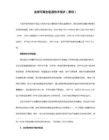
载客量
velocity
n.速度
supertrain
n.超级火车
electricity
n.电;电流
on the basis of
就…而论
overall cost
包干成本
performance
n.性能
edge
n.优势
sales campaign
n.厕所;洗手间
without
没有;不(接动名词)
declare
v.宣告
break out
爆发
on its part
在美国方面
drop
vt.丢;投掷
atom bomb
n.原子弹
Hiroshima
n.广岛
Nagasaki
n.长崎
thereupon
conj.因此;随即
manicure
vt.修剪
shaded
a.林荫遮蔽的
owe...to
归功于…
prolonged prosperity
长期的繁荣
statesmanship
n.治理国家的才能
premier
n.总理
shrewd
a.精明的
resolute
a.果断的
frugal private life
对…起作用
to be more precise
更确切地说
factors in education and mana
教育与经营方面的因素
entrepreneur
n.企业家
(完整word版)许国璋英语第二册第十三课课文、对话、练习
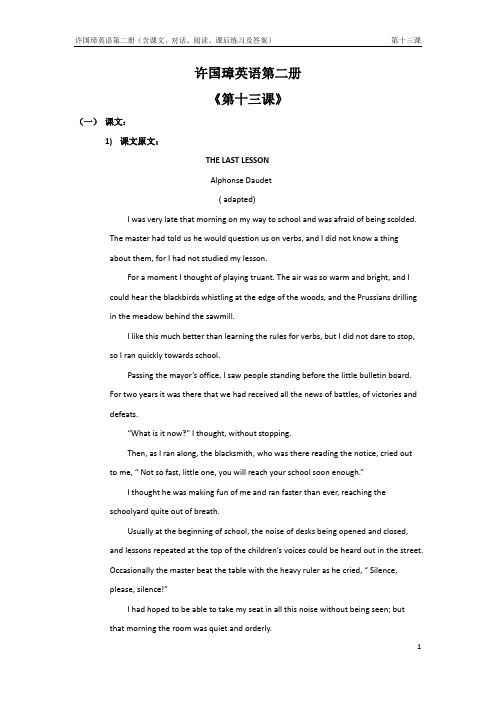
许国璋英语第二册《第十三课》(一)课文:1)课文原文:THE LAST LESSONAlphonse Daudet( adapted)I was very late that morning on my way to school and was afraid of being scolded.The master had told us he would question us on verbs, and I did not know a thingabout them, for I had not studied my lesson.For a moment I thought of playing truant. The air was so warm and bright, and I could hear the blackbirds whistling at the edge of the woods, and the Prussians drillingin the meadow behind the sawmill.I like this much better than learning the rules for verbs, but I did not dare to stop,so I ran quickly towards school.Passing the mayor’s office, I saw people standing before the little bulletin board.For two years it was there that we had received all the news of battles, of victories anddefeats.“What is it now?” I thought, without stopping.Then, as I ran along, the blacksmith, who was there reading the notice, cried out to me, “ Not so fast, little one, you will reach your school soon enough.”I thought he was making fun of me and ran faster than ever, reaching theschoolyard quite out of breath.Usually at the beginning of school, the noise of desks being opened and closed, and lessons repeated at the top of the children’s voices could be heard out in the street.Occasionally the master beat the table with the heavy ruler as he cried, “ Silence,please, silence!”I had hoped to be able to take my seat in all this noise without being seen; butthat morning the room was quiet and orderly.Through the open window I saw my schoolmates already in their places. The master was walking up and down the room with the iron ruler under his arm and a book in his hand.As I entered he looked at me kindly, and said, without scolding,” Go quickly to your place, little Franz; we were going to begin without you. You should have been here five minutes ago.”I climbed over my bench and sat down at once at my desk. Just then I noticed, for the first time, that our master wore his fine green coat and his black silk embroidered cap.But what surprised me most was to see some of the village people seated on the benches at the end of the room. One of them was holding an old spelling book on his knee; and they all looked sadly at the master.While I was wondering at this, our schoolmaster took his place. “ Children,” he said, “ this is the last time that I shall give you a lesson. An order has come from Berlin that no language but German may be taught in the schools of Alsace and Lorraine. A new master will come tomorrow who will teach you German. Today is your last lesson in French. I beg you to pay attention.”These words frightened me. This was what they had posted on the bulletin board then! This was what the blacksmith was reading!(to be continued)2)全文译文:最后一课阿方斯·都德(改写)那天早上我很晚才去上学,心中害怕要挨训斥。
许国璋英语第二册第十四课课文、对话、练习
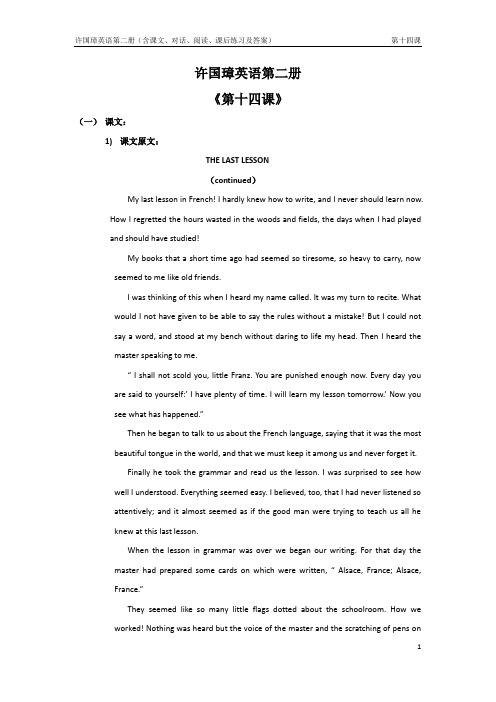
许国璋英语第二册《第十四课》(一)课文:1)课文原文:THE LAST LESSON(continued)My last lesson in French! I hardly knew how to write, and I never should learn now.How I regretted the hours wasted in the woods and fields, the days when I had playedand should have studied!My books that a short time ago had seemed so tiresome, so heavy to carry, now seemed to me like old friends.I was thinking of this when I heard my name called. It was my turn to recite. Whatwould I not have given to be able to say the rules without a mistake! But I could notsay a word, and stood at my bench without daring to life my head. Then I heard themaster speaking to me.“ I shall not scold you, little Franz. You are punished enough now. Every day you are said to yourself:’ I have plenty of time. I will learn my lesson tomorrow.’ Now yousee what has happened.”Then he began to talk to us about the French language, saying that it was the most beautiful tongue in the world, and that we must keep it among us and never forget it.Finally he took the grammar and read us the lesson. I was surprised to see how well I understood. Everything seemed easy. I believed, too, that I had never listened soattentively; and it almost seemed as if the good man were trying to teach us all heknew at this last lesson.When the lesson in grammar was over we began our writing. For that day the master had prepared some cards on which were written, “Alsace, France; Alsace,France.”They seemed like so many little flags dotted about the schoolroom. How we worked! Nothing was heard but the voice of the master and the scratching of pens onpaper. There was no time for play now. on the roof of the schoolhouse some pigeons were softly cooing, and I said to myself, “Will they, too, be obliged to sing in German?”From time to time, when I looked up from my page, I saw the master looking about him as if he wished to impress upon his mind everything in the room.After writing, we had a history lesson. Next, the little ones recited in concert their “Ba, be, be, bo, bu”.Oh, I shall always remember that last lesson!Suddenly the church clock struck twelve. The master rose from his chair. “My friends,” said he, “my friends, …i…i…”But something choked him; he could not finish the sentence. He returned to the blackboard, took a piece of chalk, and wrote in large letter, “VIVE LA FRANCE.”Then he stood leaning against the wall, unable to speak. He signed to us with his hand. “ The lesson is over. You are dismissed.”2)全文译文:最后一课(续)我最后一次上法语课了!我几乎还不会作文呢,就再也不能学了。
许国璋英语第二册(带音标)
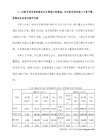
Alaska [ə'læskə] n. 阿拉斯加(美国一州)
connect [kə'nekt] vt. 连结;连接
tip [tip] n. 尖端;顶端
Siberia [sai'biəriə] n. 西伯利亚
American Indian [] 美洲印第安人
beg [beg] vt. 乞求
pretty ['priti] adj. 漂亮
happiness ['hæpinis] n. 快乐,幸福
bedtime ['bedtaim] n. 就寝的时刻
fetch [fetʃ] vt. 去拿(取)
boil [bɔil] vt. 煮沸
boiled [] 煮开的
holiday ['hɔlədi] n. 假日
suggest [sə'dʒest] vt. 提议
reservoir ['rezəvwa:] vt. 水库
the Great Wall [] 长城
revisit ['ri:'vizit] vt. 再次访问,重游
bank [bæŋk] n. 河岸
populous ['pɔpjuləs] adj. 人口稠密的
continent ['kɔntinənt] n. 洲;大陆
Asia ['eiʃə] n. 亚洲
Asian ['eiʃən] n. & adj. 亚洲人,亚洲的
America [ə'merikə] n. 美洲
North America [] 北美洲
许国璋英语第二册第十一课课文、对话、练习
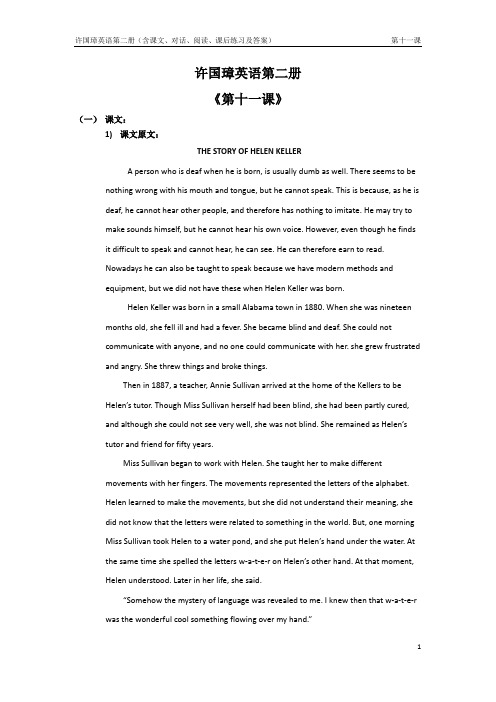
许国璋英语第二册《第十一课》(一)课文:1)课文原文:THE STORY OF HELEN KELLERA person who is deaf when he is born, is usually dumb as well. There seems to benothing wrong with his mouth and tongue, but he cannot speak. This is because, as he is deaf, he cannot hear other people, and therefore has nothing to imitate. He may try tomake sounds himself, but he cannot hear his own voice. However, even though he findsit difficult to speak and cannot hear, he can see. He can therefore earn to read.Nowadays he can also be taught to speak because we have modern methods andequipment, but we did not have these when Helen Keller was born.Helen Keller was born in a small Alabama town in 1880. When she was nineteen months old, she fell ill and had a fever. She became blind and deaf. She could notcommunicate with anyone, and no one could communicate with her. she grew frustrated and angry. She threw things and broke things.Then in 1887, a teacher, Annie Sullivan arrived at the home of the Kellers to be Helen’s tutor. Though Miss Sullivan herself had been blind, she had been partly cured,and although she could not see very well, she was not blind. She remained as Helen’stutor and friend for fifty years.Miss Sullivan began to work with Helen. She taught her to make different movements with her fingers. The movements represented the letters of the alphabet.Helen learned to make the movements, but she did not understand their meaning, shedid not know that the letters were related to something in the world. But, one morningMiss Sullivan took Helen to a water pond, and she put Helen’s hand under the water. Atthe same time she spelled the letters w-a-t-e-r on Helen’s other hand. At that moment,Helen understood. Later in her life, she said.“Somehow the mystery of language was revealed to me. I knew then that w-a-t-e-r was the wonderful cool something flowing over my hand.”Helen was smart and learned quickly. Soon she knew many words. When she was eight years old, she went to a school for the blind in Boston, and she learned to read books written for blind people., she even went to college and had a full education.She wrote many books, too. Although other people had written books about her, people agreed her own books are the ones that best explain how it feels to be deaf, dumb and blind. Her best book is the Story of My Life. Perhaps you have read it. Though it was written in 1902, it still is a very exciting book. Even if you have not read it, you may have heard of Helen Keller.2)全文译文:海伦•凯勒的故事一个人在出生时就耳聋的话,一般他也会是个哑巴。
许国璋英语第二册第一课课文、对话、练习(含答案)、课外阅读

许国璋英语第二册《第一课》(一)课文:THE LARGEST LEND AND MOST POPULOUSAsia is the largest of the continents of the world. It is a larger than Africa, larger than either of the two Americas, and four times as large as Europe. Asia and Europe form a huge land mass. Indeed Europe is so much smaller than Asia that some geographers regard Europe as a peninsula of Asia.亚洲是世界上最大的洲。
它比非洲大,比两个美洲大,是欧洲的四倍。
亚洲和欧洲形成了巨大的陆地。
事实上,欧洲比亚洲小得多,一些地理学家把欧洲视为亚洲半岛。
Many geographers say that the Ural Mountains form the dividing line between Europe and Asia. Some think differently. But all geographers agree that Asia was once linked to North America. Or, to be more exact, Alaska was at one time connected with the tip Siberia. The ancestors of American Indians, geographers say, were Asians. 30000 years ago they went across the land bridge and settled down in new homes.许多地理学家说乌拉尔山脉形成了欧洲和亚洲的分界线。
许国璋英语第二册第六课课文、对话、练习、答案

许国璋英语第二册《第六课》(一)课文:1)课文原文:LIFE AT GATESHEAD HALLIt was a cold winter day. The wind had brought dark clouds and heavy rain, so it was impossible to take a walk. Eliza, john and Georgiana were gathered round theirmother in the sitting-room. She lay on a sofa by the fireside, looking perfectly happywith her darlings about her. But she told me not to come near them because I was nota good child.I went to a small room next to the drawing-room. Taking a book from a bookcase, Iclimbed up into the window-seat. Here I sat behind the curtains and started reading. Iwas quite happy until I heard the voice of John Reed.“ Where is she?” he said, calling to his sisters, “ Eliza!Georgiana! Jane is not here.”I was glad that I had drawn the curtains, and I prayed that I should not bediscovered. But Eliza was quicker than John. She said at once: “She is in thewindow-seat of course.”I came out immediately. “ What do you want?” I asked.“Say ‘ What do you want, Master Reed’,” was his reply.” I want you to come here,”he added. And he sat down in an armchair.John Reed was a school-boy of fourteen: four years older than I, for I was only ten.He was big and stout for his age, with a large face and an unhealthy skin. John had notmuch love for his mother and sisters, but he really hated me. As I came up to his chair,he spent about three minutes in putting out his tongue at me. Then he hit me suddenlyand hard.“ What were you doing behind the curtains?”“ I was reading.”“ Show me the book.”First he put out his tongue at Jane and hit her hard. A little while later, he knockedher over with a book and grasped her hair and shoulder.I returned to the window and brought the book. “ You have no business to read our books,” John Reed continued. “ You are a dependent, Mama says. Your father left you no money. You ought to beg, and not live with a gentleman’s children. Go and stand by the door.”I did so. I turned round and saw that he was going to throw the book at me; I tried to avoid it, but it was too late. I was knocked over and fell against the door, striking my head and cutting it badly. The pain was very sharp.“Wicked, cruel boy!”I said. “You are like a murderer –you are like a slave-driver!”“ What!” he cried. “ What did you say to me? Did you hear her, Eliza and Georgiana? I’ll tell Mama. But first –“He ran at me and grasped my hair and my shoulder. But I was desperate now. I don’t know what I did with my hands, but I heard him cry for help.Mrs. Reed came. “ Take her away to the red room and lock her in,” she said. Four hands then quickly carried me upstairs.“For shame!” cried the maid. “ To strike a gentleman, your young master!”“ Master? How is he my master? Am I a servant?”“ you ought to know, miss,” said the nurse, “ that you owe much to Mrs. Reed. She keeps you. If she turns you away, you will have to go to the poor-house.”These words were not new to me; so I did not answer.( Adapted from Jane Eyre by Charlotte Bronte)2)课文译文:盖茨海德庄园生活那是一个寒冷的冬日。
许国璋英语第二册第九课课文、对话、练习
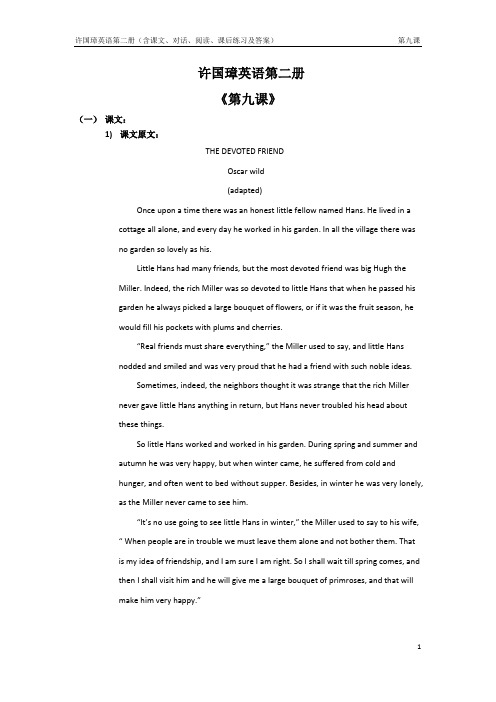
许国璋英语第二册《第九课》(一)课文:1)课文原文:THE DEVOTED FRIENDOscar wild(adapted)Once upon a time there was an honest little fellow named Hans. He lived in a cottage all alone, and every day he worked in his garden. In all the village there wasno garden so lovely as his.Little Hans had many friends, but the most devoted friend was big Hugh the Miller. Indeed, the rich Miller was so devoted to little Hans that when he passed hisgarden he always picked a large bouquet of flowers, or if it was the fruit season, hewould fill his pockets with plums and cherries.“Real friends must share everything,” the Miller used to say, and little Hans nodded and smiled and was very proud that he had a friend with such noble ideas.Sometimes, indeed, the neighbors thought it was strange that the rich Miller never gave little Hans anything in return, but Hans never troubled his head aboutthese things.So little Hans worked and worked in his garden. During spring and summer and autumn he was very happy, but when winter came, he suffered from cold andhunger, and often went to bed without supper. Besides, in winter he was very lonely,as the Miller never came to see him.“It’s no use going to see little Hans in winter,” the Miller used to say to his wife, “ When people are in trouble we must leave them alone and not bother them. Thatis my idea of friendship, and I am sure I am right. So I shall wait till spring comes, andthen I shall visit him and he will give me a large bouquet of primroses, and that willmake him very happy.”“ You think so much about others,” said his wife, “ It is a pleasure to hear what you say about friendship. I am sure the priest himself cannot say such beautifulthings as you do, though he lives in a three-storeyed house, and wears a gold ring on his little finger.”“ But why don’t we ask little Hans to come here?” said the Miller’s youngest son. “ If poor Hans in trouble I shall give him half my porridge, and show him mywhite rabbits.”“ What a silly boy you are !” cried the Miller. “ I really don’t know what is the use of sending you to school. You do not learn anything. Why , if little Hans comes here, and sees our warm fire, and our good supper, and our red wine, he will envy us, and envy is a terrible thing. Besides, if Hans comes here, he will ask me to give him some flour on credit, and I cannot do that. Flour is one thing ,and friendship isanother. The words are spelt differently and they mean quite different things.”“How right you are!” said the Miller’s wife, “ Really, I feel quite sleepy. This is just like sitting in church.”(to be continued )2)译文:忠实的朋友奥斯卡·怀尔德(改编)从前有一个诚实的小家伙叫汉斯。
许国璋英语第二册第七课课文、对话、练习

许国璋英语第二册《第七课》(一)课文:1)电视教学课文:CHALLENGESHuman beings enjoy challenges. Many of them like physical challenges. They ask themselves questions like this: How fast can I run? How high can I climb? How deep canI dive? How far can I swim? How long can I hold my breath? How much can I lift? Howhigh can I jump? Because people enjoy challenges, they like to play sports and watchother people play sports.They like climbing, running, diving, swimming, lifting, jumping, and so on. Every four years, millions of people all over the world enjoy the international sportscompetition called the Olympics. People also enjoy the excitement of climbingmountains, or of riding in a boat on a river that is moving very quickly, or of racing in acar around a track.Why do people enjoy these challenges? There are probably many reasons. One is curiosity. Another is the personal feeling of success or achievement. And now a days,for some people, it is a business. There are challenges that are not physical challenges.There are social and intellectual challenges, too.Leonardo Da Vinci, who lived in Italy during the fifteenth century, enjoyed every possible challenge. He was an artist and painted the well-known picture, the Mona Lisa.He was an inventor who invented a device to let people breathe under water. He was ascientist, and he learned a great deal about human anatomy.Another kind of challenge faced the Egyptians between 4,000 and 5,000 years ago when they decided to build the first Pyramid. People are not sure why they built thisPyramid, but it must have been important. They used six million tons of rock. Fourhundred thousand men worked for twenty years to build it.So , for thousands of years, people have accepted challenges. Today we still have many challenges before us. Medical science faces the challenge of conquering themany diseases which still attack human beings. Engineers and planners must build new cities and new kinds of transportation. Scientists must develop new forms of energy. And many of us are interested in the challenge of space. We live in an age of challenges.2)课文译文:挑战人类很享受挑战。
许国璋英语第二册第一课课文、对话、练习(含问题详解)、课外阅读

许国璋英语第二册《第一课》(一)课文:THE LARGEST LEND AND MOST POPULOUSAsia is the largest of the continents of the world. It is a larger than Africa, larger than either of the two Americas, and four times as large as Europe. Asia and Europe form a huge land mass. Indeed Europe is so much smaller than Asia that some geographers regard Europe as a peninsula of Asia.亚洲是世界上最大的洲。
它比非洲大,比两个美洲大,是欧洲的四倍。
亚洲和欧洲形成了巨大的陆地。
事实上,欧洲比亚洲小得多,一些地理学家把欧洲视为亚洲半岛。
Many geographers say that the Ural Mountains form the dividing line between Europe and Asia. Some think differently. But all geographers agree that Asia was once linked to North America. Or, to be more exact, Alaska was at one time connected with the tip Siberia. The ancestors of American Indians, geographers say, were Asians. 30000 years ago they went across the land bridge and settled down in new homes.许多地理学家说乌拉尔山脉形成了欧洲和亚洲的分界线。
许国璋英语第二册第八课课文、对话、练习讲义
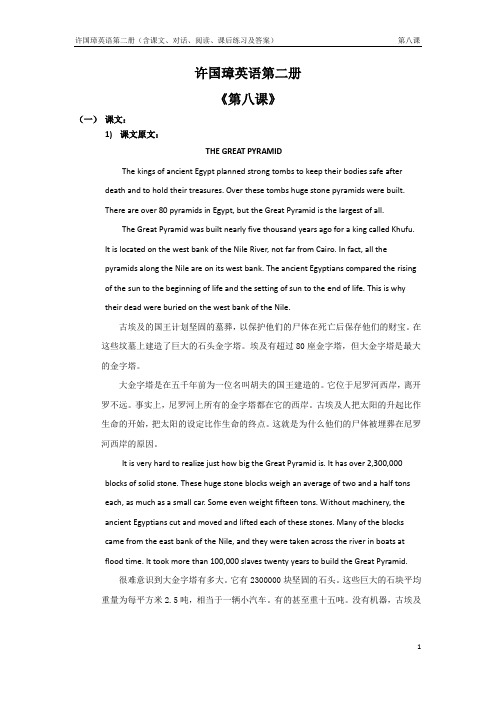
许国璋英语第二册《第八课》(一)课文:1)课文原文:THE GREAT PYRAMIDThe kings of ancient Egypt planned strong tombs to keep their bodies safe after death and to hold their treasures. Over these tombs huge stone pyramids were built.There are over 80 pyramids in Egypt, but the Great Pyramid is the largest of all.The Great Pyramid was built nearly five thousand years ago for a king called Khufu.It is located on the west bank of the Nile River, not far from Cairo. In fact, all thepyramids along the Nile are on its west bank. The ancient Egyptians compared the rising of the sun to the beginning of life and the setting of sun to the end of life. This is whytheir dead were buried on the west bank of the Nile.古埃及的国王计划坚固的墓葬,以保护他们的尸体在死亡后保存他们的财宝。
在这些坟墓上建造了巨大的石头金字塔。
埃及有超过80座金字塔,但大金字塔是最大的金字塔。
大金字塔是在五千年前为一位名叫胡夫的国王建造的。
它位于尼罗河西岸,离开罗不远。
事实上,尼罗河上所有的金字塔都在它的西岸。
许国璋英语第二册第十课课文、对话、练习题、答案
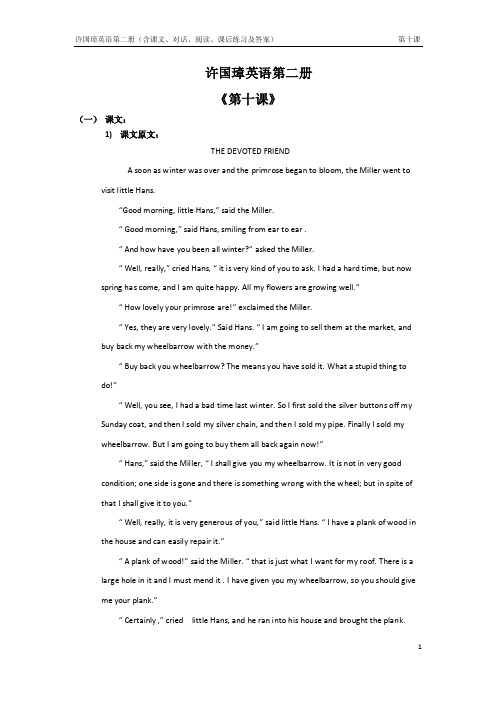
许国璋英语第二册《第十课》(一)课文:1)课文原文:THE DEVOTED FRIENDA soon as winter was over and the primrose began to bloom, the Miller went tovisit little Hans.“Good morning, little Hans,” said the Miller.“ Good morning,” said Hans, smiling from ear to ear .“ And how have you been all winter?” asked the Miller.“ Well, really,” cried Hans, “ it is very kind of you to ask. I had a hard time, but now spring has come, and I am quite happy. All my flowers are growing well.”“ How lovely your primrose are!” exclaimed the Miller.“ Yes, they are very lovely.” Said Hans. “ I am going to sell them at the market, and buy back my wheelbarrow with the money.”“ Buy back you wheelbarrow? The means you have sold it. What a stupid thing to do!”“ Well, you see, I had a bad time last winter. So I first sold the silver buttons off my Sunday coat, and then I sold my silver chain, and then I sold my pipe. Finally I sold mywheelbarrow. But I am going to buy them all back again now!”“ Hans,” said the Miller, “ I shall give you my wheelbarrow. It is not in very good condition; one side is gone and there is something wrong with the wheel; but in spite of that I shall give it to you.”“ Well, really, it is very generous of you,” said little Hans. “ I have a plank of wood in the house and can easily repair it.”“ A plank of wood!” said the Miller. “ that is just what I want for my roof. There is a large hole in it and I must mend it . I have given you my wheelbarrow, so you should give me your plank.”“ Certainly ,” cried little Hans, and he ran into his house and brought the plank.“ And now as I have given you my wheelbarrow, I am sure you will give me some flowers in return. Here is the basket. Fill it quite full.”“Quite full?” said little Hans. It was really a very big basket, and he knew that he had to pick all his flowers to fill it. He looked sad. But the Miller told him that true friends must not be selfish, so little Hans ran and picked all his pretty primroses and filled the Miller’s basket.“ Good-bye, little Hans,” said the miller as he went up the hill with the plank on his shoulder. And the big basket in his hand.The next day the Miller came and asked Hans to carry a sack of flour to the market and sell it for him. The day after, he asked him to mend his roof for him. So little Hans did one thing after another for the Miller and the Miller said all kinds of beautiful things about friendship.One evening little Hans was sitting near the fire when he heard a loud knock at the door. It was a very cold night and a terrible wind was blowing. He ran to the door and there stood the Miller with a lantern in his hand.“ Dear little Hans, “ cried the Miller,” my little boy has fallen from a ladder and hurt himself. I am going for the doctor, but he lives so far away, and it is such a bad night that I have decided to ask you to go instead. You know I am going to give you my wheelbarrow, and you must do something for me in return.”“ Certainly,” cried Little Hans. “ I shall start at once, but you must give me your lantern; the night is so dark that I am afraid I may fall into a ditch.”“ I am sorry,” answered the Miller, “ but it is my new lantern, and I am afraid something may happen to it.”“ Well, never mind, I shall go without it ,” cried little Hans and he put on his coat and hat and set off.It was a stormy night. It was so black that little Hans could hardly see anything, and the wind was so strong that he found it difficult to stand on his feet. It was raining harder and harder. Little Hans lost his way. He fell into a deep hole full of water and was drowned. The next day some goatherds found his body and brought it to the cottage.Everybody went to little Hans’ funeral. The Miller walked at the head of the procession in a long black coat, saying:” I was his best friend, so it’s only right that I should be the chief mourner.” And every now and then he wiped his eyes with a big handkerchief.2)译文:忠实的朋友(续)冬天一过,樱草花刚一开,磨坊主就去看望小汉斯了。
许国璋英语第二册第十五课课文、对话、练习

许国璋英语第二册《第十五课》(一)课文:1)课文原文:CHRISTOPHER COLUMBUSChristopher Columbus discovered America on the 12th of October, 1492. He had spent eighteen years in planning for the wonderful voyage which he made across theAtlantic Ocean. He had talked and argued with the sailors and scholars and princes andkings. “ by sailing west across the great ocean, “ he would say .“ I am sure I can reachlands that have never been visited by Europeans.”But he had been laughed at as afoolish dreamer, and few people had any faith in him. Finally the Spanish king andqueen, who were interested in finding a sea route to India, offered him ships and menso that he could carry out his plan. He crossed the ocean and discovered strange lands,inhabited by a people unknown to Europeans. He believed these lands to be part ofIndia.Early in 1493 Columbus returned to Spain. There was great rejoicing in the country, and he was hailed as hero who had made an epoch-making discovery. Crowds ofpeople lined the streets to do him honor, and the king and queen welcomed him totheir palace. Never had such great respect been shown to any common man.But there were people who were jealous of the discoverer. “Who is this Columbus?” they asked. “What has he done? Is he not an ordinary seaman from Italy?And could not any other person sail across the ocean as he had done?”One day Columbus was at a dinner given in his honor. At the party were several of these conceited fellows, who very soon tried to make him uncomfortable.“You have discovered strange lands beyond the sea,”they began. “But what of that? We do not see why there should be so much fuss about it. Anybody can sailacross the ocean, and anybody can coast along the islands on the other side, just as youhave done. It is the simplest thing in the world.”Columbus made no answer, but after a while he took an egg from a dish and saidto the guests, “ who among you, gentlemen, can make this egg stand on end?”One guest after another tried the experiment. When the egg had gone the rounds and none had succeeded, all said that it could not be done.Then Columbus took the egg and struck its small end gently upon the table so as to break the shell a little. After that there was no trouble in making it stand upright.“ Gentlemen, “ said he, “ what could be easier than this? And yet you said it was impossible! It is the simplest thing in the world. Anybody can do it – after he has been shown how.”2)全文译文:克利斯托弗·哥伦布1492年10月12日,哥伦布发现了美洲大陆。
许国璋英语第二册第一课课文、对话、练习(含问题详解)、课外阅读

许国璋英语第二册《第一课》(一)课文:THE LARGEST LEND AND MOST POPULOUS Asia is the largest of the continents of the world. It is a larger than Africa, larger than either of the two Americas, and four times as large as Europe. Asia and Europe form a huge land mass. Indeed Europe is so much smaller than Asia that some geographers regard Europe as a peninsula of Asia.亚洲是世界上最大的洲。
它比非洲大,比两个美洲大,是欧洲的四倍。
亚洲和欧洲形成了巨大的陆地。
事实上,欧洲比亚洲小得多,一些地理学家把欧洲视为亚洲半岛。
Many geographers say that the Ural Mountains form the dividing line between Europe and Asia. Some think differently. But all geographers agree that Asia was once linked to North America. Or, to be more exact, Alaska was at one time connected with the tip Siberia. The ancestors of American Indians, geographers say, were Asians. 30000 years ago they went across the land bridge and settled down in new homes.许多地理学家说乌拉尔山脉形成了欧洲和亚洲的分界线。
许国璋英语第二册第十二课课文、对话、练习

许国璋英语第二册《第十二课》(一)课文:1)课文原文:A SERVICE OF LOVEJoe came to New York from the Middle West, dreaming about painting. Delia came to New York from the South, dreaming about music. Joe and Delia met in a studio.Before long they were good friends and got married.They had only a small flat to live in, but they were happy. They loved each other, and they were both interested in art. Everything was fine until one day they found theyhad spent all their money.Delia decided to give music lessons. One afternoon she said to her husband:“ Joe, dear, I’ve found a pupil, a general’s daughter. She is a sweet girl. I’m to give three lessons a week and get $ 5 a lesson.”But Joe was not glad.“ but how about me?” he said. “ Do you think I’m going to watch you work while Iplay with my art? No, I want to earn some money too.”“ Joe, dear, you are silly,”said Delia. “ You must keep at your studies. We can live quite happily on $ 15 a week.”“ Well, perhaps I can sell some of my pictures, ” said Joe.Every day they parted in the morning and met in the evening. A week passed andDelia brought home fifteen dollars, but she looked a little tired.“ Clementina sometimes gets on my nerves. I’m afraid she doesn’t practice enough.But the general is the dearest old man! I wish you could know him, Joe.”And then Joe took eighteen dollars out of his pocket.“I’ve sold one of my pictures to a man from Peoria,” he said, “ and he has ordered another.”“ I’m so glad,” said Delia. “ Thirty-three dollars! We never had so much to spend before. We’ll have a good supper tonight.”Next week Joe came home and put another eighteen dollars on the table. In half an hour Delia came, her right hand in a bandage.“What’s the matter with your hand?” said Joe. Delia laughed and said:“ Oh, a funny thing happened! Clemntina gave me a plate of soup and spilled some of it on my hand. She was very sorry for it. And so was the old general. But why are you looking at me like that ,Joe?”“What time this afternoon did you burn your hand, Delia?”“Five o’clock. I think. The iron- I mean the soup – was ready about five. Why?”“Delia, come and sit here,” said Joe. He drew her to the couch and sat beside her.“What do you do every day, Delia? Do you really give music lessons? Tell me the truth.”She began to cry.“I couldn’t get any pupils,” she said. “ So I got a place in a laundry ironing shirts. This afternoon a girl accidentally set down an iron on my hand and I got a bad burn. But tell me. Joe, how did you guess that I wasn’t giving music lessons?”“It’s very simple,” said Joe, “ I knew all about your bandages because I had to send them upstairs to a girl in the laundry who had an accident with a hot iron. You see, I work in the engine-room of the same laundry where you work.”“And your pictures? Did you sell any to that man from Peoria?”“Well, your general with his Clementina is an invention, and so is my man from Peoria.”And then they both laughed.2)全文译文:爱的奉献乔从中西部来到纽约,梦想着绘画。
许国璋英语第二册第五课(含课文、对话、阅读、课后练习及答案)

许国璋英语第二册第五课(含课文、对话、阅读、课后练习及答案)许国璋电视英语教学第二册《第五课》(一)课文:1)课文原文:A HIGH SCHOOL TEACHERMrs. Cox teaches English in a high school in San Francisco, a big city on the West Coast of the United States. She had wanted to become a teacher when she was young.She has taught eight years now and always enjoyed her work.A school day at Mrs. Cox’s high school is divided into six periods of one hour each.Mrs. Cox teaches five of these six period s. During her “free “ period from 2 to 3 pm. Mrs.Cox has to meet with parents, order supplies, make out examinations, check assignments, and take care of many other things. So Mrs. Cox works steadily from the time she arrives at school in the morning until she leaves for home late in the afternoon, and her “free”periods isn’t really free at all.An English teacher usually divides her time among three subjects: language (grammar, punctuation, spelling, etc. ), composition, and literature. Mrs. Cox’s favori te subject is literature, and her most exciting classes are those on the literature of Black Americans.For Mrs. Cox, like most of the students in her school, is Black.In her sixth period today, Mrs. Cox taught a poem by a well-known Black writer in the United States. She wrote the poem onthe blackboard and read it aloud.No sooner had she finished reading the poem than student’s questions began pouring in. One boy said the poem was heartbreakingly sad. Another student, a girl, said she had read a book by the same writer, but she wasn’t able to enjoy it as much as hermother did, and she didn’t know why. A third, a keen viewer of TV theatre, recognized aphrase in the poem which had been used as the title of a recent play.As she answered the questions, Mrs. Cox made sure that her students understood every line of the poem. She asked them to discuss if the poem contained any message.The discussion became so lively that no one wanted to stop when the bell rang. Somesaid there was no message, some said there was, some said it didn’t really matter, andthe class ended at that.As she drove home, Mrs. Cox thought about the class she had just left. Today she could feel good about what she had accomplished as a teacher. Not one of her studentslooked bored. Every one of them seemed interested in the poem. Once they started totalk, they forgot about the time. She did not have to make them learn; she only had toanswer their questions and to guide the discussion. This, she thought to herself, is whatteaching is all about!2)原文译文:一位高中教师考克斯夫人在美国西海岸一座大城市旧金山的一所高中教英语。
- 1、下载文档前请自行甄别文档内容的完整性,平台不提供额外的编辑、内容补充、找答案等附加服务。
- 2、"仅部分预览"的文档,不可在线预览部分如存在完整性等问题,可反馈申请退款(可完整预览的文档不适用该条件!)。
- 3、如文档侵犯您的权益,请联系客服反馈,我们会尽快为您处理(人工客服工作时间:9:00-18:30)。
high adj. 高的
jump n. 跳跃
either...or conj. 或…或…
break vi. & vt. 打破,破碎
break into groups 分为小组
volley-ball n. 排球
to play class three 与第三班比赛
continent n. 洲;大陆
asia n. 亚洲
asian n. & adj. 亚洲人,亚洲的
america n. 美洲
north america 北美洲
south america 南美洲
american adj. 美洲的
europe n. 欧洲
mass n. (聚成一体的)团、块
land mass 地块
geographer n. 地理学家
regard vt. 认为
peninsula n. 半岛
the ural mountains 乌拉尔山脉
form vt. 组成;构成
divide vt. 划分;隔(分)开
disheartened adj. 灰心;失望的
scotsman n. 苏格兰人
gather vi. & vt. 聚集,集合
win vi. & vt. 战胜
invader n. 侵略者
drive vt. 驱逐;开(车)
training n. 训练
physical training 体育
uncertain adj. 变化无常的
pride n. 骄傲
religion n. 宗教
originate vi. 起源于;发源于
buddhism n. 佛教
christianity n. 基督教
palestine n. 巴勒斯坦
palestinian n. 巴勒斯坦人
opposite adj. 相反的,对面的
fix vt. 系牢
thread n. 丝,线
fail vi. 失败
poor adj. 可怜的;穷的
lose vt…失掉
hope n. & vi. 希望
almost adv. 几乎
own adj. 自己的
meet 会见
supply n. (pl.)供应品
check v. 检查
assignment n. 指定的(课外)作业
assign vt. 指定(课外作业)
steadily adv. 持续地
punctuation n. 标点符号
composition n. 作文
against prep. 反对
enemy n. 敌人
scatter vt. 使散开;击溃
force vt. 强迫
wood n. 树林
lonely adj. 偏僻的;寂寞的
rainy adj. 有雨的
lie vi. 躺着
sound n. 声音
roof n. 屋顶
trouble n. 烦恼;麻烦
swing vt. 摆动;荡
slender adj. 纤细的
line n. 线
safely adv. 安全地
call vt. 叫;召集
send vt. 送,派
message n. 信息;口信
cheer n. 鼓舞;欢呼
thanks n. 谢谢
thirsty adj. 渴
just now 刚才
steam n. 蒸气;暖气设备
fault n. 错处
wonder n. 奇事,奇迹
no wonder 怪不得
ice-box n. 冰箱
box n. 盒子
scotland n. 苏格兰
bloom n. 开花
be in bloom (花)正开着
none pron. 没有人
san francisco 圣弗兰西斯科(旧金山)
city n. 市;城市
coast n. 海岸
enjoy vt. 喜爱
period n. 课时
each adv. 各;每个
hungry adj. 饥饿
drink vt. 饮
fond adj. 喜欢
be fond of 喜欢
kiss vt. 吻
tenderly adv. 深情地,温存地
then and there 当时当地;立刻
statue n. (全身)塑像
fill vt. 充满
sofa n. 长沙发
by prep. 在旁边
fireside n. 炉边(炉火附近)
perfectly adv. 十分地
surrounding adj. 周围的
close adj. 近的;紧密的
tie n. 系带;(引抻为)联系
villager n. 村子里的人
spirit n. 精神
be in high spirits 情绪很高,兴高采烈
still adj. 安静,不动
outside prep. 在外面
the asian games 亚运会
civilization n. 文明
science n. 科学
technology n. (工业)技术
miss vt. 惦记,想念;错过
wonderful adj. 奇妙的;极好的
bit n. 小片
a bit of 一点
accomplish vt. 完成(任务等)
bore vt. 使…感到腻味
once conj. 一旦…(就)
guide vt. 引导
general adj. 总的,一般的
general cleaning 大扫除,260
broom n. 扫帚
dustpan n. 盛尘土的簸箕
bridge n. 桥梁
land bridge 地峡
settle vi. 定居;安家
canal n. 运河
the suez canal 苏伊士运河
separate vt. 使分开(离)
peak n. 山峰;最高点
foot n. 英尺
altitude n. 高度(尤指海拔)
mop n. 拖把
as well 也
downstairs adv. 在楼下,往楼下
furniture n. 家具(统称)
tidy up vt. 整理,使整齐
cloud n. 云
impossible adj. 不可能
sitting-room n. 客厅,起居室
pit n. 坑
join vt. 加入,参加
exciting adj. 令人兴奋的
picnic vi. & n. 野餐
add vt. 加上
the rest n. 其余的人(东西)
entrance n. 入口处
suppose vt. 猜想
camera n. 照相机
well-cultivated adj. 精细耕种的
pass vt. 经过
power n. 威力;电力
plant n. 工厂
valley n. 山谷
below adv. & prep. 在下面
leap n. 跳跃
keep doing something 不断地做某事
view vt. 看
television 电视
theatre n. 戏剧
tv theatre 电视剧
recognize vt. 认出;认识到
title n. 标题
recent adj. 最近的;新近的
contain vt. 包含;有
lively adj. 生动活泼的
turn to 变成
delighted adj. 大喜
采摘;拾起
happen vi. 发生
milk n. 牛奶
immediately adv. 立刻
piece n. 块,片
a piece of 一块,一片
unhappy adj. 不快,苦恼
holiday n. 假日
suggest vt. 提议
reservoir vt. 水库
the great wall 长城
revisit vt. 再次访问,重游
bank n. 河岸
the yungting river 永定河
the year before 一年前,前一年
tear n. 眼泪
beg vt. 乞求
pretty adj. 漂亮
happiness n. 快乐,幸福
bedtime n. 就寝的时刻
fetch vt. 去拿(取)
boil vt. 煮沸
boiled 煮开的
plenty n. 好些,很多
thermos bottle n. 热水瓶
century n. 世纪
rule vt. 统治
named vt. 名叫
wise adj. 聪明
brave adj. 勇敢的
soldier n. 军人,兵士,战士
invade vt. 入侵
arms n. 武器
defence n. 保卫
in defence of 保卫
quite a bit of 相当多(不可数)
quite a few 相当多(可数)
